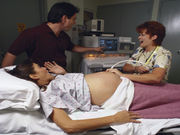No increase in rate of C-section, adverse maternal or neonatal outcomes with induction at 39 weeks
WEDNESDAY, March 2, 2016 (HealthDay News) — For older women, induction of labor at 39 weeks of gestation has no effect on cesarean section delivery or adverse outcomes compared with expectant management, according to a study published in the March 3 issue of the New England Journal of Medicine.
Kate F. Walker, B.M., B.S., from the University of Nottingham in the United Kingdom, and colleagues conducted a randomized trial involving primigravid women aged 35 years or older. Six hundred nineteen women underwent randomization to labor induction between 39 weeks and 0 days and 39 weeks 6 days of gestation or to expectant management.
The researchers found that in intention-to-treat analysis, no significant differences were seen for the labor induction or expectant management groups in the proportion of women undergoing cesarean section (32 versus 33 percent; relative risk, 0.99; 95 percent confidence interval, 0.87 to 1.14) or in the proportion who had vaginal delivery with use of forceps or vacuum (38 versus 33 percent; relative risk, 1.30; 95 percent confidence interval, 0.96 to 1.77). No maternal or infant deaths were recorded; there were no significant differences between the groups in women’s experience of childbirth or in the frequency of adverse outcomes.
“Among women of advanced maternal age, induction of labor at 39 weeks of gestation, as compared with expectant management, had no significant effect on the rate of cesarean section and no adverse short-term effects on maternal or neonatal outcomes,” the authors write.
One author disclosed financial ties to the pharmaceutical industry.
Copyright © 2016 HealthDay. All rights reserved.








